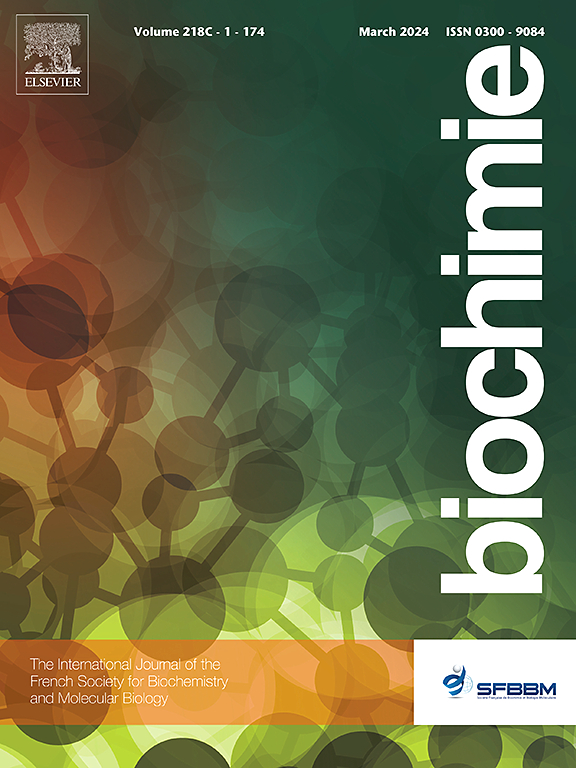Park7 (DJ-1), a Parkinson-associated glyoxalase/deglycase: characterization of enzymatic activity in biological samples using fluorescence-based liquid chromatography
IF 3
3区 生物学
Q2 BIOCHEMISTRY & MOLECULAR BIOLOGY
引用次数: 0
Abstract
Glycation is an inevitable nonenzymatic covalent reaction between nucleophilic groups in proteins and nucleotides, and endogenous reducing sugars or dicarbonyls (e.g., methylglyoxal) leading to protein and/or nucleotide covalent modifications. This process initiates a series of dehydrations, oxidations and rearrangements that lead to a myriad of products called advanced glycation end products (AGEs). Previously, we showed that Park7 (or DJ-1) is a protein deglycase that repairs methylglyoxal-glycated biomolecules by acting on early glycation intermediates and releasing the repaired biomolecule and lactate. Moreover, the PARK7 gene is associated with recessive and sporadic forms of Parkinson's disease (PD). Thus, over the last few years, the function of Park7 has become an important research topic for understanding the etiology of PD. In this context, the development of sensitive enzymatic assays is crucial to quantify the activity of Park7 and develop specific modulators. Here, we describe a new method for measuring Park7 activity based on the separation and quantification of glycated and unglycated fluorescent nucleotides by Liquid Chromatography (LC). Kinetic and mechanistic analyses using human recombinant Park7 confirmed the reliability of this approach. In addition, this assay was further validated using cellular lysates. Our results indicate that this novel Park7 assay is simple, sensitive, and specific.
Park7 (DJ-1),一种帕金森相关的glyoxalase/deglycase:利用荧光液相色谱法表征生物样品中的酶活性。
糖基化是蛋白质和核苷酸中的亲核基团与内源性还原糖或二羰基(如甲基乙二醛)之间不可避免的非酶促共价反应,导致蛋白质和/或核苷酸的共价修饰。这一过程引发了一系列脱水、氧化和重排,从而产生了无数被称为晚期糖基化终产物(AGEs)的产物。在此之前,我们发现Park7(或DJ-1)是一种蛋白脱糖酶,通过作用于早期糖基化中间体并释放修复的生物分子和乳酸来修复甲基乙二醛糖基化的生物分子。此外,PARK7基因与隐性和散发形式的帕金森病(PD)有关。因此,在过去的几年中,Park7的功能已成为了解PD病因学的重要研究课题。在这种情况下,开发敏感的酶分析方法对于量化Park7的活性和开发特定的调节剂至关重要。在此,我们描述了一种基于液相色谱(LC)分离和定量糖基化和非糖基化荧光核苷酸的检测Park7活性的新方法。利用重组人Park7进行的动力学和机理分析证实了该方法的可靠性。此外,使用细胞裂解物进一步验证了该分析。我们的结果表明,这种新的Park7检测方法简单、敏感、特异性强。
本文章由计算机程序翻译,如有差异,请以英文原文为准。
求助全文
约1分钟内获得全文
求助全文
来源期刊

Biochimie
生物-生化与分子生物学
CiteScore
7.20
自引率
2.60%
发文量
219
审稿时长
40 days
期刊介绍:
Biochimie publishes original research articles, short communications, review articles, graphical reviews, mini-reviews, and hypotheses in the broad areas of biology, including biochemistry, enzymology, molecular and cell biology, metabolic regulation, genetics, immunology, microbiology, structural biology, genomics, proteomics, and molecular mechanisms of disease. Biochimie publishes exclusively in English.
Articles are subject to peer review, and must satisfy the requirements of originality, high scientific integrity and general interest to a broad range of readers. Submissions that are judged to be of sound scientific and technical quality but do not fully satisfy the requirements for publication in Biochimie may benefit from a transfer service to a more suitable journal within the same subject area.
 求助内容:
求助内容: 应助结果提醒方式:
应助结果提醒方式:


